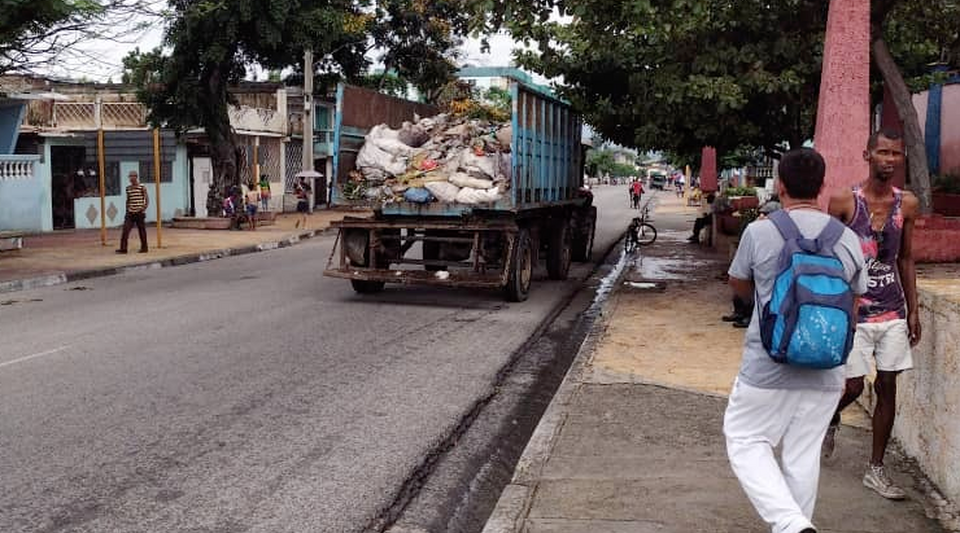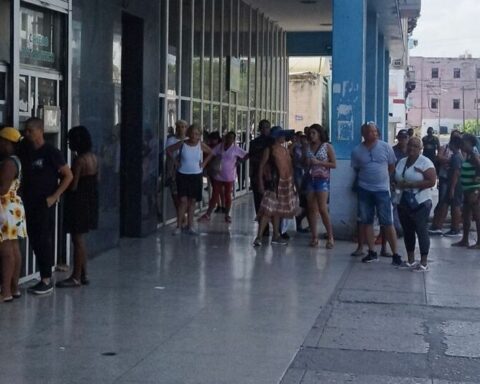The rains and neglect are playing a trick on the city of Santiago de Cuba. What started as a months-long expected downpour, due to the drought, has turned into streets littered with mud, rubbish and fallen branches. The Provincial Communal Company does not have the resources to alleviate the discomfort of the neighbors in the face of so much filth.
“Look how they have left that waste collector,” laments Julia, a resident of the Veguita de Galo neighborhood in the capital of Santiago. “The truck came to try to take the garbage but in the end it couldn’t and it practically knocked over this container and it ended up deforming and breaking with the fall,” the woman describes.
A huge waste receiver, which has traditionally been used to collect rubble and larger debris, sits on the side of the road broken and littered with bags, food scraps, old appliance casings, tree trunks and all manner of debris. “The smell doesn’t let us live in the houses that are closer,” laments Julia.
“The problem is that they did not do any work prior to the rains. When the downpours began, the garbage had not been collected for days and, of course, now it weighs more because it is wet”
“The problem is that they did not do any work prior to the rains. When the downpours began, the garbage had not been collected for days and, of course, now it weighs more because it is wet and also the plague is greater,” he told 14ymedio this Santiago. “We are paying the consequences of the lack of foresight of Comunales”.
On the corner of D and E streets in the same neighborhood, the landslide from a hill last Friday caused partial collapse of several houses located on top of it, dragged trees and a good amount of mud and stones. The residents themselves have had to cut the branches and move them out of the way, but they have not been able to do much to remove the heavier debris from the road.
Instead of vehicles specialized in garbage collection, the Comunales de Santiago de Cuba company barely has cargo trucks. Employees must handle waste without the necessary protection means for that work. “We are working with the soul because here they don’t even give us gloves,” admits Fabricio, an employee of the state entity who prefers not to say his real name to avoid reprisals.
“Everyone knows that we have to work practically only with our hands, they haven’t given us uniforms for a while now, nor boots, nor belts to protect us when we have to carry heavy garbage, nor caps to protect us from the sun. I have had several colleagues with skin cancer problems because they have spent years and years working in this way”, points out Fabricio.
“If there is no flour for the bread, what can be expected from Comunales, which has always been the last wheel in the cart,” he says. “They beat us all over the place, the bosses who start to promise things that later we are the ones who have to leave our skins to be able to fulfill them and the people in the street who do not understand that all this garbage that is not collected is not our fault, but that there are no resources”:
“We live like animals. What’s more, there are animals that live with more hygiene than us”
Last January, the local newspaper Sierra Maestra spoke with Alexis Mora Sarmiento, Coordinator of Objectives and Programs of the Provincial Government on the sanitation of the city. The official pointed out that there was a “deficit of tires and batteries in the province,” and that the municipality of Santiago de Cuba was the most affected by this situation, since it is where there is the most garbage. In the remaining territories, 90% of the collection is with wheelbarrows.
Then, he promised that “as soon as the resources enter the country, they will be bought to start the trucks we have available” and “500 plastic containers for public waste will be acquired, which will be distributed in various places in the city. To preserve them it is very their care in the neighborhood is important”. But after more than five months that prognosis has not come true.
“We live like animals. What’s more, there are animals that live with more hygiene than us,” says Julia, from the Veguita de Galo cast. “On top of a bush or inside a cave you live more cleanly than in this city. And it’s not something that I close the door of my house and I don’t care, all this gets into the houses, like bad smells and The diseases”.
The fear of many residents of Santiago de Cuba is that the summer and its high temperatures, the frequent rains and the poor garbage collection will come together again to put the city in epidemiological check. “Cholera has already come back here like a relative that nobody wants to visit, but it comes when it wants to,” Julia envisions.
________________________
Collaborate with our work:
The team of 14ymedio He is committed to doing serious journalism that reflects the reality of deep Cuba. Thank you for accompanying us on this long road. We invite you to continue supporting us, but this time becoming a member of our newspaper. Together we can continue transforming journalism in Cuba.








